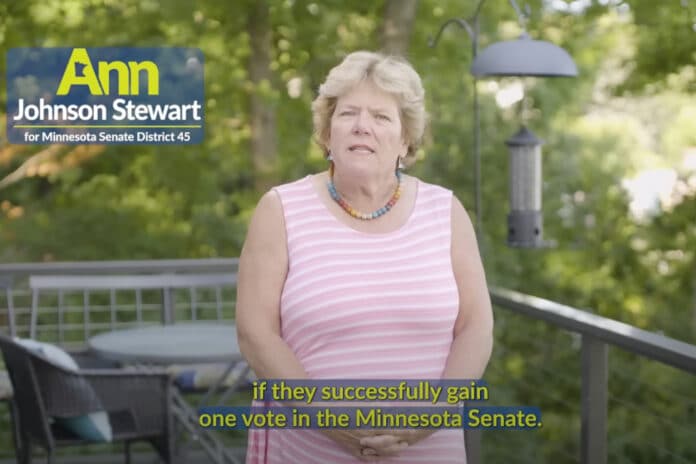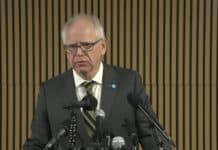
The Minnesota Senate currently has 33 Republicans, 33 Democrats, and one vacant seat. This vacancy was created after Democrat Kelly Morrison resigned her Lake Minnetonka Senate seat to run for Congress. In turn, the vacancy will be filled via a special election on Election Day, Nov. 5.
This Lake Minnetonka seat is the only state Senate seat on the ballot this year; the full Minnesota Senate will not be up for election until November 2026.
Ann Johnson Stewart, herself a former state senator, is the DFL candidate in this race that will determine whether Republicans or Democrats control the Senate. Earlier this year, she put out a campaign video that is prominently displayed on her website in which she states the following:
“As the mom of three daughters and a grandma, I’ll champion women and families and will always protect women’s reproductive freedom. Extremist Republicans want to take these freedoms away, putting politicians in doctor’s offices and imposing reproductive decisions onto families. If they successfully gain one vote in the Minnesota Senate, they’ll have the power to do so.”
While it is true that a Republican victory in the special election would give the GOP a 34-33 majority in the Senate, this does not mean Republicans would have the power to change state law regarding abortion.
Changes to state law generally require authorization from the Minnesota House of Representatives, the Minnesota Senate, and Minnesota’s governor.
Republicans could indeed win majorities in both the House and Senate this year. However, the state’s governorship is currently controlled by Democrat Tim Walz, and the office will not be on the ballot until November 2026.
Even if Gov. Walz left office to assume the vice presidency in the next few months, Democrat Lt. Gov. Peggy Flanagan would take his place. As such, either Walz or Flanagan would have the power to approve or veto any legislation passed by a Republican legislature.
The only way to override a governor’s veto is by a two-thirds vote of both the House and the Senate. Given the fact that the full Senate is not on the ballot this year, the GOP is mathematically incapable of winning the required number of seats to override a veto.
Should Republicans win both chambers of the Minnesota Legislature this year, any legislative changes to Minnesota’s laws would still need either the approval of a Democratic governor or Democratic legislators; Republicans will not be able to make changes to Minnesota’s abortion laws simply by winning the Senate special election this year.
Johnson Stewart’s GOP opponent in the special election, Kathleen Fowke, has repeatedly said that she will not vote to ban abortion if elected to fill the seat.
“If elected, I will not put heavy handed restrictions on women, nor will I vote to ban abortion,” said Fowke in a recent video. “Let’s work together, and find ways to support women.”
Of course, legal challenges to Minnesota’s laws and precedents could result in changes to state policy, but the partisan makeup of the Minnesota Senate would have no impact on any of those legal challenges.










